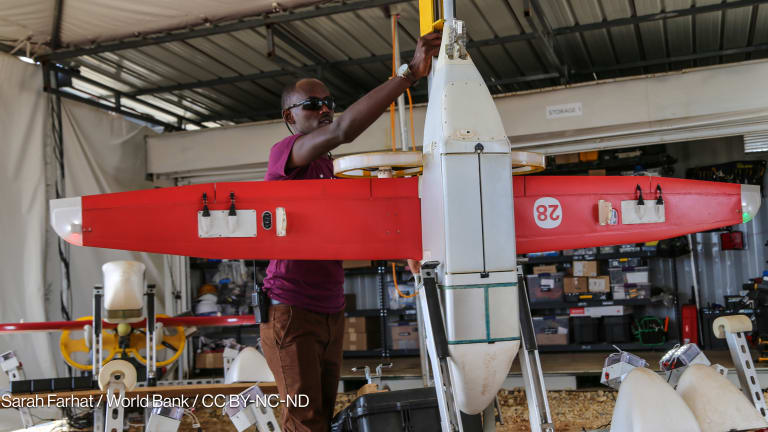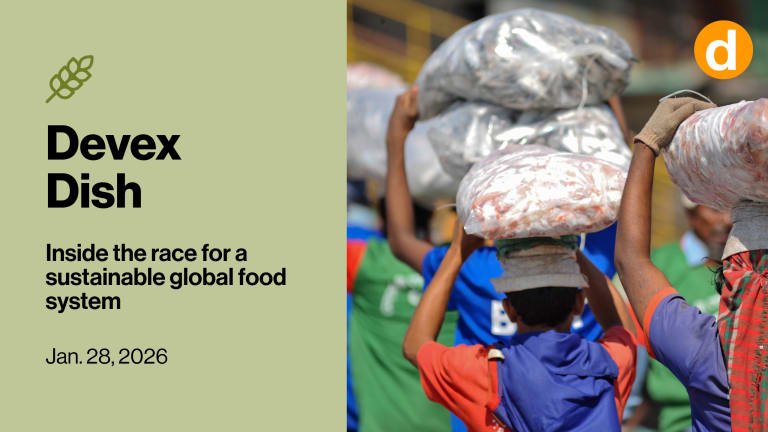Supply chain unit is sign of shifting business model: Chemonics CEO
Jamey Butcher, CEO at Chemonics International, talks about why his company has launched a new subsidiary, and how it is changing in response to the pandemic and localization.
Chemonics International, the U.S. international development contractor, recently launched a new subsidiary to provide supply chain services in the development sector. Jamey Butcher, CEO at Chemonics, told Devex the decision is part of wider thinking about how to adapt its business model to a post-COVID-19 world, influenced by pressures of climate change and localization. The subsidiary, Connexi, builds on Chemonics’ history of managing supply chains for large international donors. Chemonics is best known for its management of an eight-year, $9.5 billion contract for medical supply chain services to the U.S. Agency for International Development. The organization came under intense scrutiny early in the contract, although it is now being delivered in line with targets. The contract is a large part of a bigger push from the company to win USAID business, which has seen its transactions with the agency increase from around $439 million in fiscal year 2011 to $1.7 billion in fiscal year 2021, according to USAspending.gov. Connexi is intended to expand services to a wider audience of private health care providers, other donors, and national governments. Contracts requiring a larger range of services will go through the parent company, while Connexi will provide more specialist offerings. “People come to us, and they say, ‘We want to get X from Y to Z,’ and we make that happen,” Butcher said. “Over the course of the USAID contract, we’ve learned more about shipping, logistics, and warehousing. We’ve learned how to reduce the waste involved and increase the on-time delivery rate. We wanted an entity that would allow us to share those private sector practices more widely across the NGO and public sector.” He said that Connexi will use a network of thousands of partner agencies. “We can plan how long it will take and what the best routes are,” he said. “We know what regulatory structures you need to navigate. We have warehouse agreements. We have people working in-country who can get the goods through customs and then do the ‘last mile’ logistics.” A shift in the way of doing business Butcher said Connexi is just one example of a shift in the way that Chemonics is doing business in response to changing behavior from customers. “There are shifts in funding which are affecting organizations like ours,” he said. “It means we have to evolve our organizations to continue to provide services in the way that are consistent with their goals. We’re making those changes, and Connexi is an example of that. We will see more organizational changes as time passes.” He said the clearest change was a move toward local implementation. The shift to local funding is one that is being pushed by NGOs and national donors alike. In particular, USAID recently made commitments to quadruple the amount of funding it provides at a local level. This is not the first time that the agency has tried to press for more local procurement, and on previous occasions, its largest contractors have pushed back against it. However, Butcher said this is a direction of travel that Chemonics will support, saying he expects the company to shift its business model to act as a support organization for local providers. “As the donor community changes to engage more with local organizations, there are needs being uncovered that Chemonics can meet,” he said. “Things like managing funds responsibly, systems and tools and expertise that ensure that ethics are being upheld. We need to change our business model so we help perpetuate those local providers of services. “That agenda has been propelled by the pandemic,” he added. “It’s taken the direction of travel we were already on, and it’s amplified it. And the agenda is also being propelled by USAID. Administrator [Samantha] Power set some rightly ambitious targets. It’s the right trajectory, and we’ve been pushing down that path as a business ever since I joined.” Grant management One example of Chemonics’ growing support role is around grant funding, Butcher said. “We expect funders to place more emphasis on NGOs with a firsthand perspective who are effective at fostering change,” he said. “But at the same time, donors are expecting more accountability, more data, more measurement, more impact reporting. So we’re trying to find a way to do both. One good example is in our work managing grants.” Butcher said Chemonics received around a quarter of its revenue annually in grants to manage on behalf of other donors. “We offer a consistent risk management approach to make sure that money is spent effectively,” he said. “Donors expect high-impact, transparent, accountable fund management.” “We have to evolve our organizations to continue to provide services in the way that are consistent with … [customers’] goals. We’re making those changes, and Connexi is an example of that.” --— Jamey Butcher, CEO, Chemonics Ways of working The pandemic and localization have both been causing changes in the way Chemonics is staffed and run, Butcher said. “We now have more than 90% of our staff in the countries where we work, and they are doing tremendous work every day,” he said. “It’s the path we’re already on, and I think we’ll continue in that direction. And within Chemonics, the pandemic has allowed us to connect much more closely with our global staff. Training and events that were face to face are now virtual and have been opened up to our full audience of 5,000 people worldwide. “The way we work won’t ever go back to how it was. I think we will find a third way that’s better than it was two years ago. The virtual environment has pushed us to work in new and creative ways.” A continued focus on London Butcher said that this commitment to working internationally includes remaining in London. Chemonics opened a new office in the U.K. shortly before the pandemic, and he said that despite the country’s cuts to the Foreign, Commonwealth & Development Office budget, Chemonics will continue to have London as an area of focus. “We remain committed to the London office, and we’re there for the long haul,” he said. “We think this is still a potential growth area for us. We’re not taking a step back from London at all. We’re continuing to implement some extremely important programs there. The change in FCDO funding has created uncertainty, but the U.K. remains committed to provide a portion of its GNI [gross national income] as development assistance. And as long as that’s the case, our approach won’t change.” Areas of focus Right now, medical supply chains remain Chemonics’ largest area of work, Butcher said. But he is interested in expanding to supply chains across other parts of the development sector, he added, and launching Connexi was partly an attempt to do that. Butcher also talked about other areas of potential expansion. “Climate change is an area that’s clearly at the top of the priority list,” he said. “Sustainable cities, infrastructure, energy — all of these are emerging as geographic focal points for the donor community. We’re going to focus on these areas as well. And different technologies are emerging around things like climate management and access to clean water. These are areas that we believe we can add some value.”
Chemonics International, the U.S. international development contractor, recently launched a new subsidiary to provide supply chain services in the development sector.
Jamey Butcher, CEO at Chemonics, told Devex the decision is part of wider thinking about how to adapt its business model to a post-COVID-19 world, influenced by pressures of climate change and localization.
The subsidiary, Connexi, builds on Chemonics’ history of managing supply chains for large international donors.
This story is forDevex Promembers
Unlock this story now with a 15-day free trial of Devex Pro.
With a Devex Pro subscription you'll get access to deeper analysis and exclusive insights from our reporters and analysts.
Start my free trialRequest a group subscription Printing articles to share with others is a breach of our terms and conditions and copyright policy. Please use the sharing options on the left side of the article. Devex Pro members may share up to 10 articles per month using the Pro share tool ( ).
David Ainsworth is business editor at Devex, where he writes about finance and funding issues for development institutions. He was previously a senior writer and editor for magazines specializing in nonprofits in the U.K. and worked as a policy and communications specialist in the nonprofit sector for a number of years. His team specializes in understanding reports and data and what it teaches us about how development functions.








